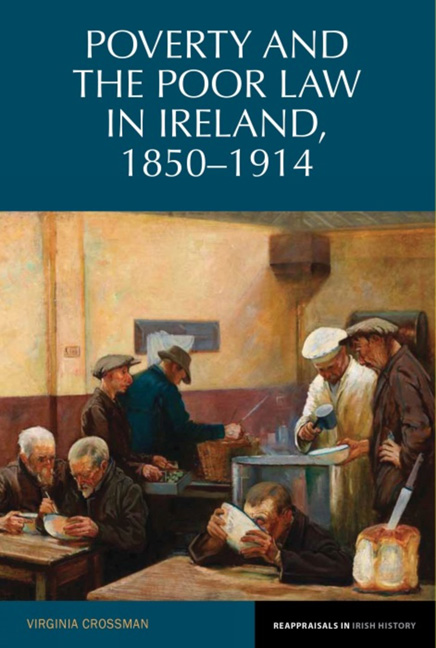Book contents
- Frontmatter
- Contents
- List of Figures
- List of Tables
- List of Maps
- Acknowledgements
- Introduction
- Chapter 1 Concepts of Poverty and Poor Relief
- Chapter 2 Context and Trends
- Chapter 3 Outdoor Relief
- Chapter 4 The Workhouse
- Chapter 5 The Sick, Infirm and Lunatics
- Chapter 6 Single Mothers and Prostitutes
- Chapter 7 Mendicancy and Vagrancy
- Conclusion
- Note on statistics and Sources
- Bibliography
- Index
Chapter 1 - Concepts of Poverty and Poor Relief
- Frontmatter
- Contents
- List of Figures
- List of Tables
- List of Maps
- Acknowledgements
- Introduction
- Chapter 1 Concepts of Poverty and Poor Relief
- Chapter 2 Context and Trends
- Chapter 3 Outdoor Relief
- Chapter 4 The Workhouse
- Chapter 5 The Sick, Infirm and Lunatics
- Chapter 6 Single Mothers and Prostitutes
- Chapter 7 Mendicancy and Vagrancy
- Conclusion
- Note on statistics and Sources
- Bibliography
- Index
Summary
Pre-Famine Ireland was a country seemingly defined by poverty. The condition of the people shocked travellers and reinforced a sense of a place that was separate, different and foreign, not an integral part of the United Kingdom. Writing in the late 1830s, French social and political commentator, Gustave de Beaumont remarked that misery, ‘naked and famishing’, was evident ‘everywhere, and at every hour of the day, it is the first thing you see when you land on the Irish coast, and from that moment it ceases not to be present to your view’. Irish poverty, de Beaumont asserted, had ‘a special and exceptional character, which … can be compared with no other indigence. Irish misery forms a type by itself, of which neither the model nor the imitation can be found anywhere else.’ To British observers, poverty in Ireland was a product and a reflection of the backwardness of the country and the character of the people. The poor were represented almost as a different race, closer to savages than to civilised people. Furthermore, as Glen Hooper has observed, while the poor in England were described as being part of British society and British life, the poor in Ireland were ‘an ethnologically intriguing, but frequently detached community separated from the upper classes not just on social but on religious, cultural and sometimes linguistic grounds’. The mass of the Irish people seemed to occupy a space outside civilised society.
Post-Famine Ireland seemed like a different country. Death and emigration had removed so many people that in many districts the countryside appeared deserted. The impression now conveyed to travellers was of a virgin land ripe for development. The poor had not disappeared completely but they were less numerous and less visible. Irish society remained deeply divided. Community leaders, politicians and churchmen aligned themselves with the poor and pledged to advance their interests condemning the impoverishment of Ireland by rapacious landlords and the sufferings of the Irish tenant. Living standards improved, but Irish tenants felt poor in relation to their landlords. From being a condition of the entire population, extreme poverty was now mainly confined to the far west of the country, and to the major cities. Where previously visitors had expressed disbelief at the extent of poverty, they now expressed disbelief about its existence, often doubting whether the distress they encountered was genuine.
- Type
- Chapter
- Information
- Poverty and the Poor Law in Ireland, 1850–1914 , pp. 12 - 32Publisher: Liverpool University PressPrint publication year: 2013



